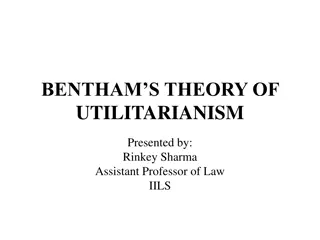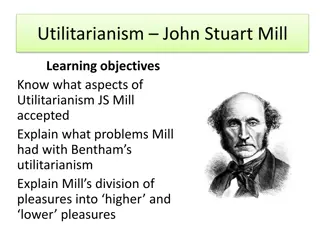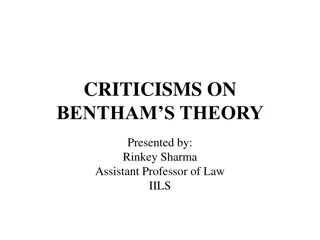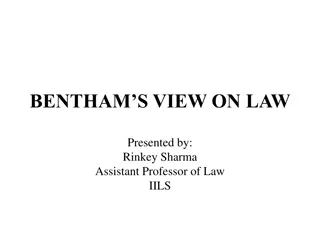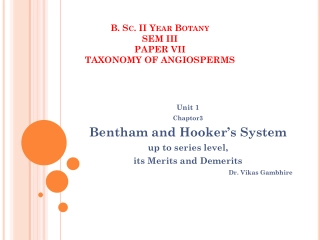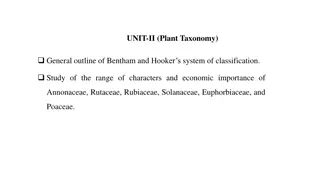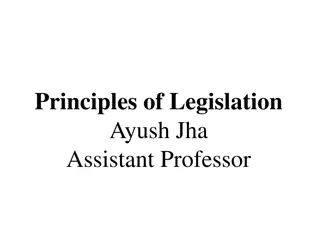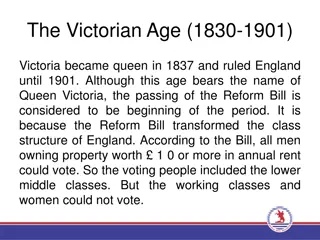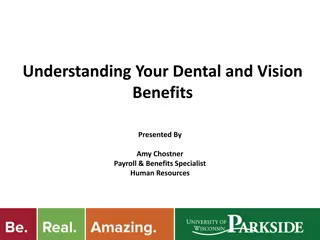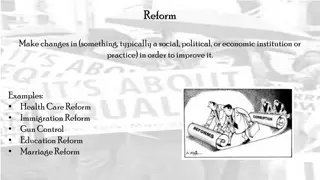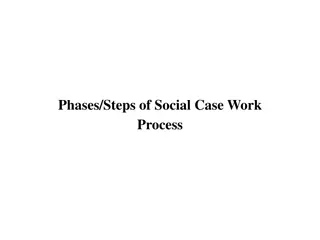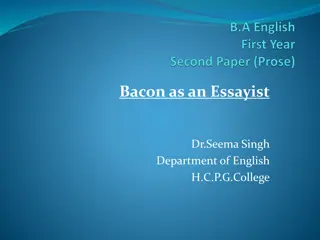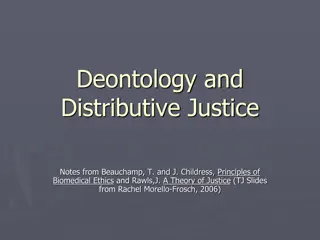Jeremy Bentham and Utilitarianism: A Vision for Social Reform
Jeremy Bentham, a prominent philosopher of the 18th and 19th centuries, advocated for utilitarianism, which states that the greatest happiness of the greatest number should be the measure of right and wrong. He proposed the concept of the Panopticon as a new mode of obtaining power over individuals. Bentham's main tenets included individual and economic freedom, equal rights for women, and abolition of slavery and the death penalty. His Felicific Calculus outlined factors to measure the utility of actions based on intensity, duration, certainty, propinquity, fecundity, purity, and extent.
Download Presentation

Please find below an Image/Link to download the presentation.
The content on the website is provided AS IS for your information and personal use only. It may not be sold, licensed, or shared on other websites without obtaining consent from the author. Download presentation by click this link. If you encounter any issues during the download, it is possible that the publisher has removed the file from their server.
E N D
Presentation Transcript
Jeremy Bentham 1748-1832 (UCL: 1826; James Mill)
In Short Intense, long, certain, speedy, fruitful, pure Such marks in pleasures and in pains endure. Such pleasures seek if private be thy end: If it be public, wide let them extend Such pains avoid, whichever be thy view: If pains must come, let them extend to few. Aristotle; Hobbes; Helvetius
age 173 age 13
Panopticon a new mode of obtaining power of mind over mind, in a quantity hitherto without example As the watchmen cannot be seen, they need not be on duty at all times, effectively leaving the watching to the watched. According to Bentham's design, the prisoners would also be used as menial labour walking on wheels to spin looms or run a water wheel. Millbank: 1799
Main Tenets individual and economic freedom separation of church and state, freedom of expression, equal rights for women, decriminalisation of homosexual acts abolition of slavery abolition of the death penalty abolition of physical punishment, including that of children.
Utilitarianism fundamental axiom, it is the greatest happiness of the greatest number that is the measure of right and wrong Nature has placed mankind under the governance of two sovereign masters, pain and pleasure. It is for them alone to point out what we ought to do, as well as to determine what we shall do. On the one hand the standard of right and wrong, on the other the chain of causes and effects, are fastened to their throne. They govern us in all we do, in all we say, in all we think. (1789)
Felicific Calculus utility: Intensity: How strong is the pleasure? Duration: How long will the pleasure last? Certainty or uncertainty: How likely or unlikely is it that the pleasure will occur? Propinquity or remoteness: How soon will the pleasure occur? (can t find discount function) state probability: Fecundity: The probability that the action will be followed by sensations of the same kind. Purity: The probability that it will not be followed by sensations of the opposite kind. promiscuity: Extent: How many people will be affected?
In Short Intense, long, certain, speedy, fruitful, pure Such marks in pleasures and in pains endure. Such pleasures seek if private be thy end: If it be public, wide let them extend Such pains avoid, whichever be thy view: If pains must come, let them extend to few.
14 Pleasures; 12 Pains The pains of privation (lack of pleas). The pains of the senses. The pains of awkwardness The pains of enmity. The pains of an ill name. The pains of piety. The pains of benevolence. The pains of malevolence. The pains of the memory. The pains of the imagination. The pains of expectation. The pains dependent on association The pleasures of sense. The pleasures of wealth. The pleasures of skill. The pleasures of amity. The pleasures of a good name. The pleasures of power (inc Machiav). The pleasures of piety. The pleasures of benevolence. The pleasures of malevolence. The pleasures of memory. The pleasures of imagination. The pleasures of expectation. The pleasures dependent on association. The pleasures of relief.
e.g. The pleasures of power are the pleasures that accompany the persuasion of a man's being in a condition to dispose people, by means of their hopes and fears, to give him the benefit of their services: that is, by the hope of some service, or by the fear of some disservice, that he may be in the way to render them. The pleasures of malevolence are the pleasures resulting from the view of any pain supposed to be suffered by the beings who may become the objects of malevolence: to wit, 1. Human beings. 2. Other animals. These may also be styled the pleasures of ill-will, the pleasures of the irascible appetite, the pleasures of antipathy, or the pleasures of the malevolent or dissocial affections. ? expectation utilities are particularly strong?
more sophisticated: if time is taken to calculate the best course of action it is likely that the opportunity to take the best course of action will already have passed 1st order: immediate; 2ndorder: signalling: alarm and danger : It is true there are cases in which, if we confine ourselves to the effects of the first order, the good will have an incontestable preponderance over the evil. Were the offence considered only under this point of view, it would not be easy to assign any good reasons to justify the rigour of the laws. Every thing depends upon the evil of the second order; it is this which gives to such actions the character of crime, and which makes punishment necessary. Let us take, for example, the physical desire of satisfying hunger. Let a beggar, pressed by hunger, steal from a rich man's house a loaf, which perhaps saves him from starving, can it be possible to compare the good which the thief acquires for himself, with the evil which the rich man suffers? It is not on account of the evil of the first order that it is necessary to erect these actions into offences, but on account of the evil of the second order.
Karl Marx Not even excepting our philosopher, Christian Wolff, in no time and in no country has the most homespun commonplace ever strutted about in so self-satisfied a way. The principle of utility was no discovery of Bentham. He simply reproduced in his dull way what Helv tius and other Frenchmen had said with esprit in the 18th century. With the driest naivet he takes the modern shopkeeper, especially the English shopkeeper, as the normal man. Whatever is useful to this queer normal man, and to his world, is absolutely useful. This yard-measure, then, he applies to past, present, and future. With such rubbish has the brave fellow, with his motto, "nulla dies sine line!," piled up mountains of books "the insipid, pedantic, leather-lipped oracle of the commonplace bourgeois intelligence of the nineteenth century
Auto-Icon My body I give to my dear friend Doctor Southwood Smith to be disposed of in a manner hereinafter mentioned, and I direct ... he will take my body under his charge and take the requisite and appropriate measures for the disposal and preservation of the several parts of my bodily frame in the manner expressed in the paper annexed to this my will and at the top of which I have written Auto Icon. The skeleton he will cause to be put together in such a manner as that the whole figure may be seated in a chair usually occupied by me when living, in the attitude in which I am sitting when engaged in thought in the course of time employed in writing. I direct that the body thus prepared shall be transferred to my executor. He will cause the skeleton to be clad in one of the suits of black occasionally worn by me. The body so clothed, together with the chair and the staff in the my later years bourne by me, he will take charge of and for containing the whole apparatus he will cause to be prepared an appropriate box or case and will cause to be engraved in conspicuous characters on a plate to be affixed thereon and also on the labels on the glass cases in which the preparations of the soft parts of my body shall be contained ... my name at length with the letters ob: followed by the day of my decease. If it should so happen that my personal friends and other disciples should be disposed to meet together on some day or days of the year for the purpose of commemorating the founder of the greatest happiness system of morals and legislation my executor will from time to time cause to be conveyed to the room in which they meet the said box or case with the contents therein to be stationed in such part of the room as to the assembled company shall seem meet . Queens Square Place, Westminster, Wednesday 30th May, 1832.



